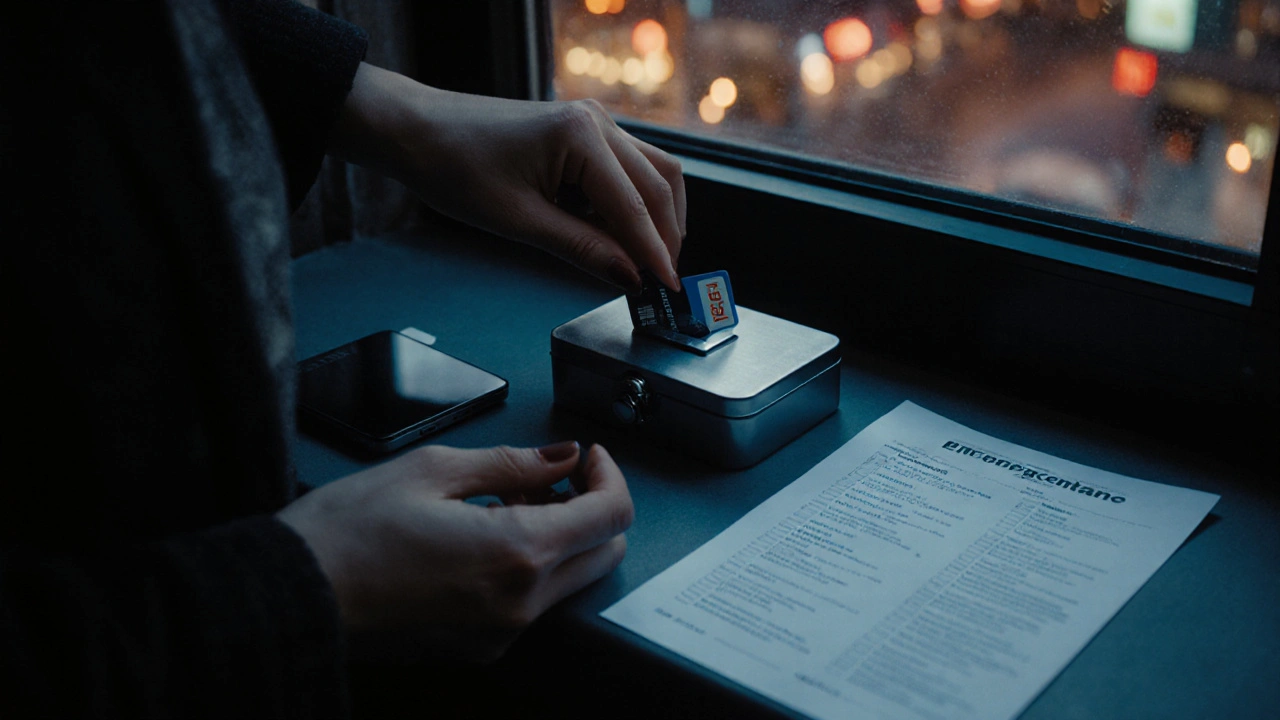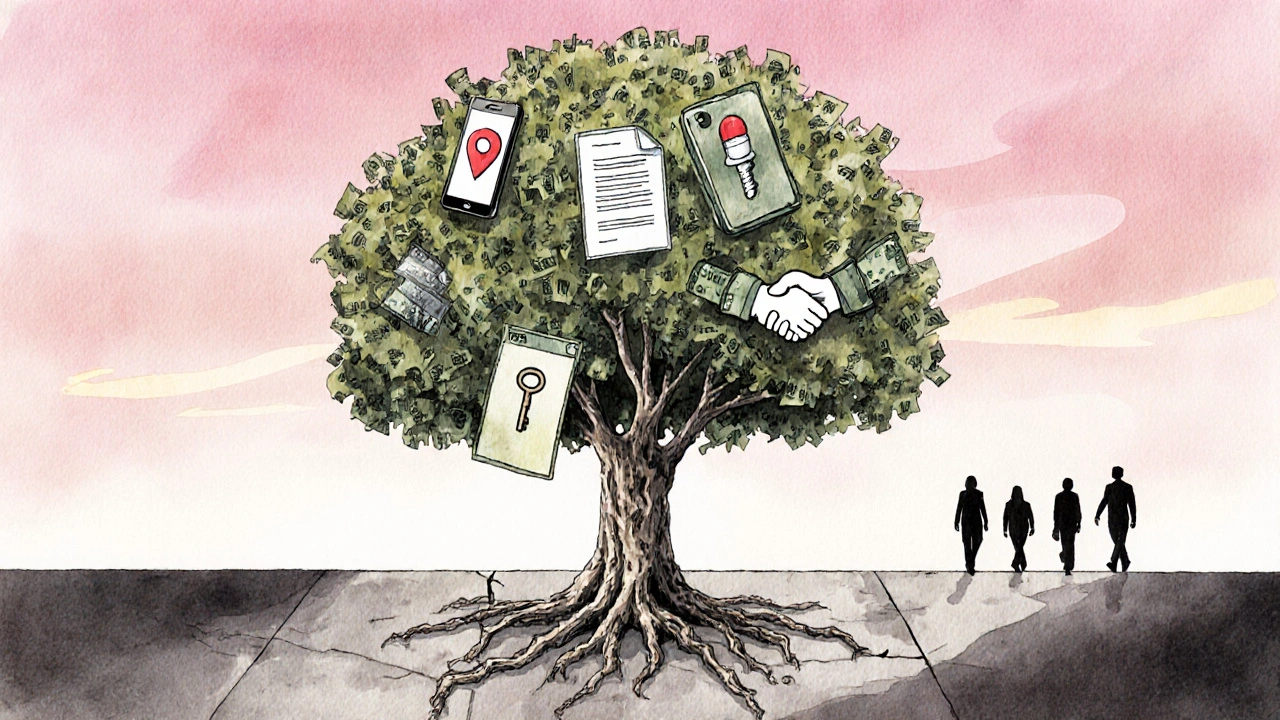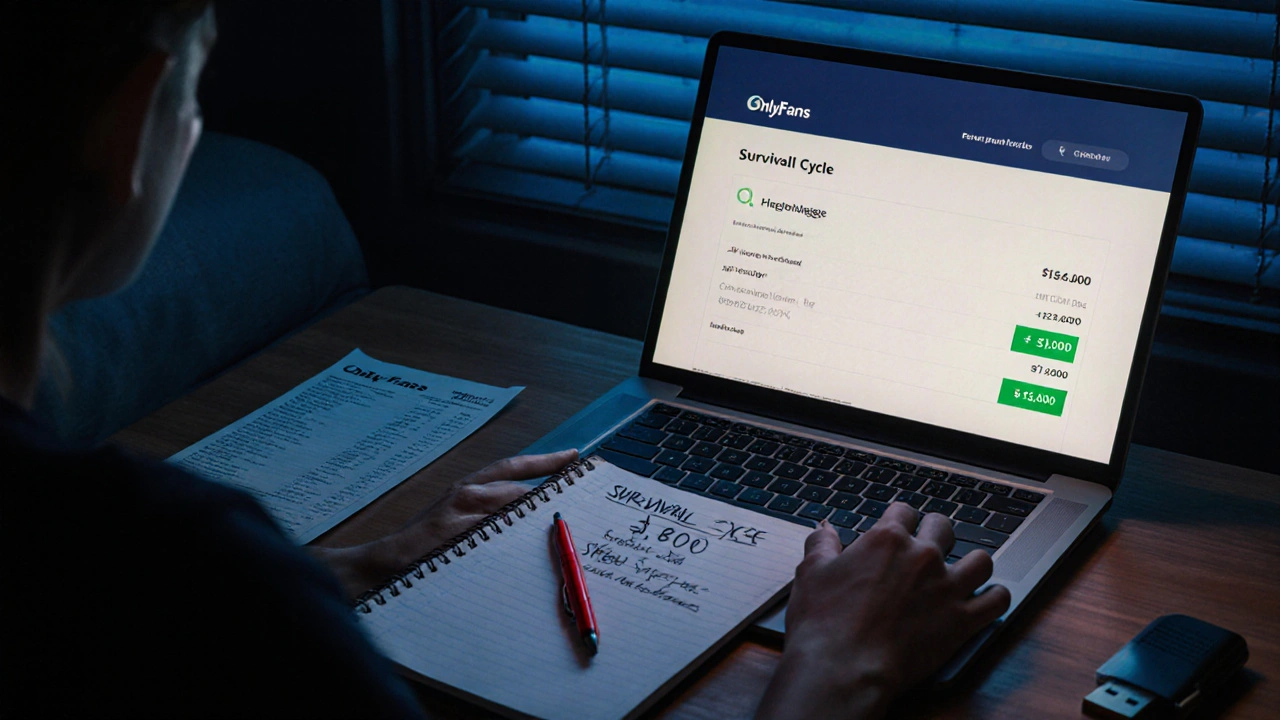When you work in sex work, your income isn’t just irregular-it’s unpredictable. One day you might earn $800; the next, you might earn nothing. Clients cancel last minute. Platforms change their rules. Police raids shut down a safe space. A sudden illness or family emergency hits. Without a plan, you’re one bad week away from being unable to pay rent, buy food, or get medical care. This isn’t about being cautious-it’s about surviving.
Why Traditional Budgeting Doesn’t Work
Most financial advice assumes you get paid on the 1st and 15th. That’s not your reality. You don’t have a steady paycheck. You don’t have sick leave. You don’t have a safety net built by your employer. If you try to budget like someone with a 9-to-5, you’ll end up broke and frustrated.Instead of thinking in monthly budgets, think in survival cycles. A survival cycle is the minimum amount of money you need to cover your basic needs for 30 days without any income. For some, that’s $500. For others, it’s $2,000. It depends on rent, medication, transport, food, phone bills, and any legal fees you might need to cover.
Once you know your survival cycle number, you stop chasing big earnings and start chasing consistency. Your goal isn’t to get rich-it’s to never be caught off guard.
How to Build an Emergency Fund When Income Is Unstable
Start small. Even $10 a week adds up. If you earn $300 one week, put $20 aside. If you earn $800, put $50 aside. Don’t wait until you have ‘extra’ money. That day never comes. You have to force it.Open a separate bank account. Not just a savings account-something you can’t touch without real effort. Call it your ‘Safety Net Fund’. Make it hard to access. Link it to a different app. Hide the login details. Don’t tell anyone about it-not even your closest friend. This isn’t about secrecy because you’re ashamed. It’s about survival. If someone tries to pressure you into spending it, you need a way to say no that doesn’t involve lying.
Set up automatic transfers if your payment platform allows it. If you use an app like OnlyFans or a local booking service, check if you can split your payout. Even 5% automatically going to your safety net fund changes everything over time.
Track your progress. Write it down. Use a notebook. Use a notes app. Don’t rely on memory. When you hit $500, celebrate. That’s one full survival cycle. When you hit $1,000, you’ve got two. When you hit your full target-say $2,500-you’re not just safe. You’re free to walk away from a bad client, take a sick day, or leave a dangerous situation without panic.
Where to Keep Your Emergency Fund
Don’t keep cash under your mattress. It gets stolen. It gets lost. It doesn’t grow. Don’t use crypto unless you know exactly what you’re doing. Volatility can wipe you out in hours.Use a basic savings account at a bank that doesn’t require in-person visits. In Australia, banks like ME Bank, Heritage Bank, or credit unions like People’s Choice offer no-fee, online-only savings accounts. They pay a small amount of interest-maybe 3% to 4%-and you can access your money with a few taps. No branches. No questions asked. Just you and your phone.
Some sex workers use prepaid debit cards loaded with their safety fund. That’s okay if you need an extra layer of separation. But avoid cards with high fees. Read the fine print. Look for ‘no monthly fee’, ‘no ATM withdrawal fee’, ‘no inactivity fee’.
Never use family members’ accounts. Even if they’re trustworthy, it creates risk. If they get audited, or if they pass away, your money could be frozen or claimed by someone else. Your safety net belongs to you. Only you.

Build a Safety Net Beyond Money
Money is only one part of your safety net. You also need people, systems, and backup plans.Find one trusted person you can call if you’re in trouble. Not your partner. Not your friend who might judge you. Someone neutral. A peer from a sex worker collective. A case worker from a support org like Scarlet Alliance. Someone who won’t panic or ask you to explain yourself. Give them your location before every job. Send a check-in text when you’re done. If you don’t hear back in two hours, they call the police.
Keep a ‘safety kit’ in your bag or car: a portable charger, a burner phone, a small first aid kit, a copy of your ID, and a printed list of emergency contacts. Include the number for your local sex worker advocacy group. In Australia, that’s Scarlet Alliance. They offer legal advice, crisis support, and can connect you with free counseling.
Use apps like RedZone or SafeRide-apps made by and for sex workers. They let you log client details, share your location with trusted contacts, and flag dangerous people. These aren’t just tools-they’re lifelines.
Plan for the Unexpected
What if you get sick? What if you’re arrested? What if your phone is seized? What if your online accounts get hacked?Start with a digital backup plan. Save all your important documents-ID, proof of address, tax records, client contracts-on a password-protected USB drive. Keep it in a safe place. A friend’s house. A locker. A safety deposit box. Don’t rely on cloud storage if you’re worried about surveillance.
Set up a trusted contact who can access your digital life if something happens. Give them your password to your email. Your OnlyFans. Your bank app. Write it down on paper. Put it in an envelope. Label it: ‘In case I disappear’. Give it to your safety net person.
Know your legal rights. In Australia, sex work is legal in most states, but laws vary. In Western Australia, where you’re working, indoor sex work is legal with registration. If you’re stopped by police, you don’t have to answer questions. You don’t have to let them search your bag unless they have a warrant. Write this down. Keep it on your phone. Know your rights before you need them.
What Not to Do
Don’t use your emergency fund for rent if you’re behind. That’s not an emergency-it’s a symptom. If you’re consistently short on rent, you need to change your income strategy, not drain your safety net.Don’t borrow money from clients. Ever. It creates power imbalances. It puts you at risk of coercion. It makes you vulnerable to blackmail.
Don’t rely on apps that promise ‘instant cash advances’. They charge 50% interest. You’ll end up owing more than you borrowed.
Don’t ignore your mental health. Financial stress is real. Talk to someone. Use free services. In Perth, the Sex Worker Outreach Project offers free counseling. No judgment. No paperwork. Just support.

Real-Life Example: Maria’s Story
Maria worked in Perth for five years. She earned between $200 and $1,200 a week. She never saved. Then, in 2024, her car broke down. She needed $1,800 to fix it. She had $47 in her account. She had to cancel three bookings, borrow $1,000 from a friend, and sell her laptop to make up the rest.After that, she started saving $25 a week. She opened a separate account. She used RedZone to log every client. She gave her safety net contact her location every night. Six months later, she had $1,500 saved. When her sister had a medical emergency, Maria sent her $800 without panicking. She didn’t have to beg, borrow, or risk her safety.
She didn’t become rich. But she became unshakable.
Next Steps: Your 30-Day Plan
Here’s what to do in the next 30 days:- Calculate your survival cycle: Add up your minimum monthly costs (rent, food, transport, phone, meds, etc.). That’s your target.
- Open a separate savings account. No frills. No fees. Just savings.
- Set up an automatic transfer of $10-$50 per week. Even if you earn $50 that week, still put $10 in.
- Download RedZone or SafeRide. Set up your emergency contacts.
- Save your ID and key documents on a USB drive. Store it somewhere safe.
- Find your local sex worker support group. Save their number. Call them once. Just to say hi.
You don’t need to do it all at once. But you need to start. Today. Not tomorrow. Not when you have more money. Now.
What Happens When You Build This Safety Net?
You stop living in fear. You stop taking dangerous clients just to pay the bills. You stop feeling trapped. You start making choices based on your safety, not your desperation.This isn’t about being perfect. It’s about being prepared. You don’t need a finance degree. You don’t need to be good with numbers. You just need to take one small step every week.
And when you do-you’ll realize something powerful: you’re not just surviving. You’re building a life that’s yours.
Can I use my emergency fund to pay for legal help if I’m arrested?
Yes. Legal fees are one of the top reasons sex workers need emergency funds. If you’re arrested, your safety net should cover lawyer fees, bail, or transport to court. In Australia, organizations like Scarlet Alliance can connect you with pro bono lawyers. Don’t wait until you’re in court to find help-keep the contact info in your safety kit.
What if I live in a state where sex work is illegal?
Even in places where sex work is criminalized, you still need financial safety. Build your emergency fund the same way. Use prepaid cards or cash envelopes. Keep digital backups off the cloud. Reach out to national networks like the Global Network of Sex Work Projects (NSWP). They offer guidance for high-risk areas and can connect you with local support.
How much should I save before I feel safe?
Aim for three times your monthly survival cycle. If your basic needs cost $800 a month, save $2,400. That gives you 8 weeks of breathing room. Most people in sex work need at least 6-10 weeks to recover from a crisis-illness, eviction, client violence, platform ban. Three months of coverage is the minimum for real security.
Can I use my emergency fund for travel if I need to leave town?
Yes-if it’s for safety. If your area becomes dangerous, if you’re being stalked, or if you need to escape an abusive situation, your emergency fund exists for this. Travel isn’t a luxury here-it’s survival. Keep receipts. Track where you go. This isn’t spending. It’s protecting your life.
What if I lose access to my bank account?
Some banks freeze accounts if they suspect sex work activity. That’s why you need a backup. Keep a small amount of cash on you-$200-$500. Use a second prepaid card linked to a different bank. Store your safety net in multiple places. If one account is blocked, you still have a way to survive. Don’t put all your eggs in one basket.
